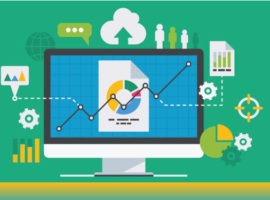Using data analytics in business to uncover hidden treasures
 Using data analytics in business can unearth hidden treasures, but what's the best way? The cloud can help. Find out how.
Using data analytics in business can unearth hidden treasures, but what's the best way? The cloud can help. Find out how.
When Kate Middleton and Prince William announced their engagement in 2010, sapphire blue dresses like hers were sold out within 24 hours. The “Kate effect” was born. Yet unexpected spikes in sales, a surge in new user signups, or high rates of abandoned shopping carts continue to baffle retailers today.
With the growing volume, complexity and velocity of data, it’s no surprise that businesses often only consider small subsets of what’s available for analytics. Research suggests that several of today’s best-of-class application operators are using less than six percent of their collected data.
Continuously monitoring business data for anomalies helps identify the root cause and respond faster to such hidden events and changing trends.
This approach to analytics provides continuous intelligence that helps brands make smart, real-time business decisions.
 Using data analytics in business can unearth hidden treasures, but what's the best way? The cloud can help. Find out how.
Using data analytics in business can unearth hidden treasures, but what's the best way? The cloud can help. Find out how.
Traditionally, dashboards are checked periodically to monitor the most relevant KPIs and manually explore data along pre-defined paths. However, considering only pre-defined indicators and performance metrics leads to a limited perspective and misses information about unknown signals and trends in other parts of the data or at lower granularity.
Keeping track of what is relevant in this very moment is therefore a challenge for businesses across industries. Enter continuous intelligence.
According to Gartner, continuous intelligence “is a design pattern in which real-time analytics are integrated within a business operation, processing current and historical data to prescribe actions in response to events. It provides decision automation or decision support.”
The approach uses a variety of technologies such as machine learning, event stream processing, optimization, and business rule management.
 AI and ML-driven insights are powering the future of analytics. Learn the data trends that will transform businesses with powerful results.
AI and ML-driven insights are powering the future of analytics. Learn the data trends that will transform businesses with powerful results.
While humans cannot inspect every possible characteristic and combination in the flood of incoming data, machines can.
Complementing analytics that provide precise answers to questions users know to ask, a machine can continuously monitor data in the background to detect unknown correlations and trends that deviate from what would have been expected by the system based on previous observations.
This way, companies can identify hidden, but potentially relevant signals in the data. Gartner predicts that by 2022, more than half of major new business systems will incorporate continuous intelligence capabilities.
By integrating AI-based continuous intelligence into their day-to-day operations, companies can:
By automatically inspecting critical business health indicators such as revenue, web page views, active users, or transaction volume in real time, businesses can accelerate their time to insight and action and to help better respond to situations before business is impacted.
 No more guessing games: With e-commerce analytics, businesses get real-time insight to help them deliver the most effective customer experience.
No more guessing games: With e-commerce analytics, businesses get real-time insight to help them deliver the most effective customer experience.
The SAP Innovation Center Network (ICN) is exploring the business potential and requirements of continuous intelligence and developed a prototype of a self-learning cloud service.
This service autonomously discovers patterns in historic data to detect trends in new data that deviate from the expected. Insights are ranked by relevance and proactively provided to the user as comprehensive data stories with full context.
Especially in industries with fast-moving assets such as retail, the service could be critical for quickly adapting to changing buying behavior, trends and market conditions. It could alert retailers to surging sales of Kate Middleton lookalike dresses, food trends such as avocados and oat milk, or demand for umbrellas due to bad weather.
But more than retailers could benefit. Service ticketing is another area of application that the ICN team is investigating.
With continuous intelligence, service personal could, for instance, identify hot topics of interests, indicated by an unusually high number of open tickets. Then, they could respond with tailored material for additional information.
 Retail trends to watch this year include omnichannel, digital-first CX, direct-to-consumer, and hyper-personalized marketing.
Retail trends to watch this year include omnichannel, digital-first CX, direct-to-consumer, and hyper-personalized marketing.
Relying solely on default indicators and monitoring standard KPIs is no longer sufficient when it comes to understanding and responding to the dynamics of complex systems or businesses.
Looking ahead, continuous intelligence is expected to become the norm as the speed at which businesses must react to rapidly changing market conditions will only increase. It will be a critical component for companies that want to point users to relevant data and trigger actions when it matters most.